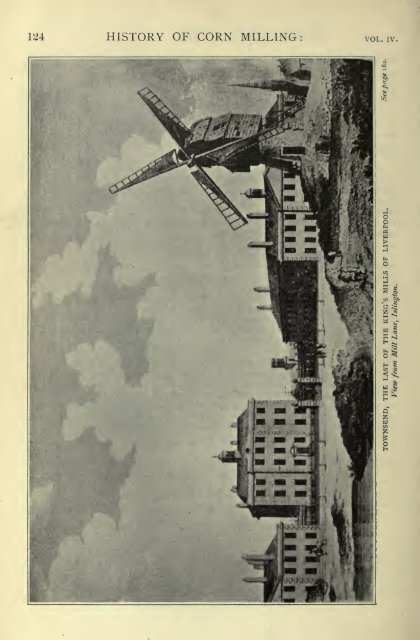History of corn milling .. - Centrostudirpinia.it
History of corn milling .. - Centrostudirpinia.it History of corn milling .. - Centrostudirpinia.it
124 HISTORY OF CORN MILLING: VOL. IV.
SOME FEUDAL MILLS. 125 CHAPTER IV. KING'S MILLS OF THE ROYAL BOROUGH OF LIVERPOOL.^ 1. The archaeology of corn milling in Liverpool ^ing's^ills widely contrasts with that of any of the medieval Liverpool. cities already considered. The royal soke of the i. Eastham manor, small and insignificant enough when first dis- WatermiUs, cerned in Plantagenet days, grew concurrently with the development of the embryo town and port ; and safely endured beyond that critical period which extinguished the soke of Dublin Castle and Shrews- in one bury Abbey, though it was never comprised powerful mill, as was the soke of Chester in Dee Mill. The king's mills of Liverpool consisted of several separate establishments, held directly under the Crown, usually conjointly ; and sub-leased separately. So long as the soke was retained by the Crown, these mills successfully conserved their legal rights; but when that binding link was broken— this being when Charles L in 1629 alienated his ancient inheritance in Liverpool and its mills— the new holders of the soke * By the favour of the Corporation of Liverpool, and many obliging facilities of officials in the Town Clerk's department, much information relating to the milling history of the town has been derived from the Port Mote books, dating from the year 1551, and the Okill collection of transcripts of early Duchy deeds, &c., included in the archives of the city. A brief outline sketch, The King's Mills of Ancient Liverpool, prepared from the draft of the present chapter, and contributed by Mr. Bennett to the Historic Society of Lancashire and Cheshire in 1896, varies in several material details from the history now presented. This is due to many further investigations having since been made to solve difficulties, then experienced, in linking together the fragmentary records which are all that remain to Liverpool. A fair amount of success has resulted ; mainly by the kindness of Mr. R. D. Radcliffe, M.A., F.S.A., and Mr. W. Farrer, in affording full investigation of transcripts of the Moore and Crosse Charters, and of many local deeds found by the latter gentleman in Additional MSS. at the British Museum. ^ ^' ' ^
- Page 93 and 94: SOME FEUDAL MILLS. 73 quantity as m
- Page 95 and 96: ought'oTrind. SOME FEUDAL MILLS 75
- Page 97 and 98: SOME FEUDAL MILLS. 77 son of Willia
- Page 99 and 100: SOME FEUDAL MILLS. 79 and there aby
- Page 101 and 102: SOME FEUDAL MILLS. 81 hath byn out
- Page 103 and 104: SOME FEUDAL MILLS. 83 mills for twe
- Page 105 and 106: SOME FEUDAL MILLS. 19 Henry VIL (15
- Page 107 and 108: SOME FEUDAL MILLS. 87 keeping the o
- Page 109 and 110: SOME FEUDAL MILLS. 89 esq., testifi
- Page 111 and 112: SOME FEUDAL MILLS. 91 September 4,
- Page 113 and 114: SOME FEUDAL MILLS. 93 suffer him to
- Page 115 and 116: SOME FEUDAL MILLS. 95 with certain
- Page 117 and 118: SOME FEUDAL MILLS. 97 years at this
- Page 119 and 120: SOME FEUDAL MILLS. 99 continuance o
- Page 121 and 122: SOME FEUDAL MILLS. 101 And that the
- Page 123 and 124: SOME FEUDAL MILLS. 103 they themsel
- Page 125 and 126: SOME FEUDAL MILLS. the river of Dee
- Page 127 and 128: SOME FEUDAL MILLS. 107 another mana
- Page 129 and 130: SOME FEUDAL MILLS. 109 parishioner]
- Page 131 and 132: SOME FEUDAL MILLS. Ill displeasure
- Page 133 and 134: SOME FEUDAL MILLS. 113 Dee right of
- Page 135 and 136: SOME FEUDAL MILLS. 115 In due cours
- Page 137 and 138: SOME FEUDAL MILLS. 117 •111* 1 Pe
- Page 139 and 140: SOME FEUDAL MILLS. 119 bene." He di
- Page 141 and 142: SOME FEUDAL MILLS. 121 in his house
- Page 143: SOME FEUDAL MILLS. 123 at St. Mary'
- Page 147 and 148: SOME FEUDAL MILLS. 127 Ere long the
- Page 149 and 150: SOME FEUDAL MILLS. 129 In these ref
- Page 151 and 152: SOME FEUDAL MILLS. 131 Everton was
- Page 153 and 154: SOME FEUDAL MILLS. 133 been establi
- Page 155 and 156: SOME FEUDAL MILLS. 135 Dam, East-to
- Page 157 and 158: SOME FEUDAL MILLS. 13' SITE OF MEDI
- Page 159 and 160: SOME FEUDAL MILLS. 139 selions of l
- Page 161 and 162: SOME FEUDAL MILLS. 141 Dat apud Lyv
- Page 163 and 164: SOME FEUDAL MILLS. 143 amount of th
- Page 165 and 166: SOME FEUDAL MILLS. 145 Molyneux, wh
- Page 167 and 168: SOME FEUDAL MILLS. 14' And that you
- Page 169 and 170: SOME FEUDAL MILLS. 149 In July 1577
- Page 171 and 172: SOME FEUDAL MILLS. 151 and their su
- Page 173 and 174: SOME FEUDAL MILLS. 153 shall be bou
- Page 175 and 176: SOME FEUDAL MILLS. 165 annum; and,
- Page 177 and 178: SOME FEUDAL MILLS. 167 his wood of
- Page 179 and 180: SOME FEUDAL MILLS. 159 ** 14. As th
- Page 181 and 182: SOME FEUDAL MILLS. 161 and store Ki
- Page 183 and 184: SOME FEUDAL MILLS. 163 comandinge t
- Page 185 and 186: SOME FEUDAL MILLS. 165 thinketh, wh
- Page 187 and 188: SOME FEUDAL MILLS. 167 the actual w
- Page 189 and 190: SOME FEUDAL MILLS. 169 burgesses an
- Page 191 and 192: SOME FEUDAL MILLS. 171 KING S MILLS
- Page 193 and 194: SOME FEUDAL MILLS. 173 assigns (inh
124 HISTORY OF CORN MILLING: VOL. IV.



